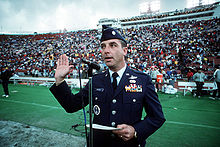How’s that military career working out for you? This is a question many of us had to ask ourselves as we neared the end of our enlistment. I’m sure most of the military personnel from past generations also had that same question on their minds.
Today, with an all-volunteer military, that question is probably more meaningful than at anytime since World War II, because regardless of your political leanings, it would be impossible not to realize the US economy is in trouble with massive, unsustainable debt, growing inflation, and unemployment levels not seen since the Great depression.
On my check-off list of things to consider when contemplating leaving the military, employment is at the top. With millions not being able to find jobs, it might be prudent to have a clear path to employment before making the choice to go civilian. In case you didn’t catch that list:
- Employment
- Housing
- School benefits (whether going back to school or finding a school for the children)
- Medical/Dental coverage
- GI Loans
- On going support services for those physically disabled from military service also have to be addressed
- Dealing with emotional and mental disabilities from combat must also be confronted
Because of its importance, let’s look at how you can best deal with the issue of employment, I mean what’s the best way to insure you will have a job the minute you leave your last duty station.
There are probably a lot of folks better at giving advice about the job market, but over the years I’ve witnessed a lot of truisms and learned some basic facts about employment searching. Such things as taking an inventory of your strengths and weaknesses, and developing a professional looking resume, are a prelude to assessing whether or not to launch your employment campaign. If you are planning to work and continue your education once you have your discharge, it might behoove you to develop a daily schedule of anticipated hours you can devote to school, work and family. If you are comfortable looking at the schedule, then you can realistically move into phase two; Job Possibilities.
When I looked at my first professional employment search, I started by making a “Loves-Likes-OK List” of what I really liked to do, followed by things I didn’t mind doing, and lastly, things I might be good at but wasn’t too enthralled about doing the rest of my life. Then I made up a list of everyone I knew that had an “in” at a potential place that might employee me to work doing something on my “Loves-Likes-OK List”. Sounds crazy, but between those two lists it landed me my first job.
Back in those days we didn’t have the Internet, on line educational courses, and all the support (email follow-up, easy-access job postings, etc) that makes the job market so competitive today. We also didn’t have such high unemployment. So, in a way you have assets that can both work for you and against you at the same time, but I think your generation has a slight advantage. Today’s military also has it it’s disposal, many military veterans, friends of the military, and other concerned entities that provide services, that were never available decades ago.
Websites like www.military.com should be visited prior to making the move to civilian because of the importance of having a way to earn a living outside the military. Spend a lot of time on Military Transitions and Veterans Jobs by clicking to links at the top of the homepage on this worthy site.

Following his service in the Marine Corps Ed Mattson built a diverse career in business in both sales/marketing and management. He is a medical research specialist and published author. His latest book is Down on Main Street: Searching for American Exceptionalism
Ed is currently Development Director of the National Guard Bureau of International Affairs-State Partnership Program, Fundraising Coordinator for the Warrior2Citizen Project, and Managing Partner of Center-Point Consultants in North Carolina.
Mr. Mattson is a noted speaker and has addressed more than 3000 audiences in 42 states and 5 foreign countries. He has been awarded the Order of the Sword by American Cancer Society, is a Rotarian Paul Harris Fellow and appeared on more than 15 radio and television talk-shows.
ATTENTION READERS
We See The World From All Sides and Want YOU To Be Fully InformedIn fact, intentional disinformation is a disgraceful scourge in media today. So to assuage any possible errant incorrect information posted herein, we strongly encourage you to seek corroboration from other non-VT sources before forming an educated opinion.
About VT - Policies & Disclosures - Comment Policy




